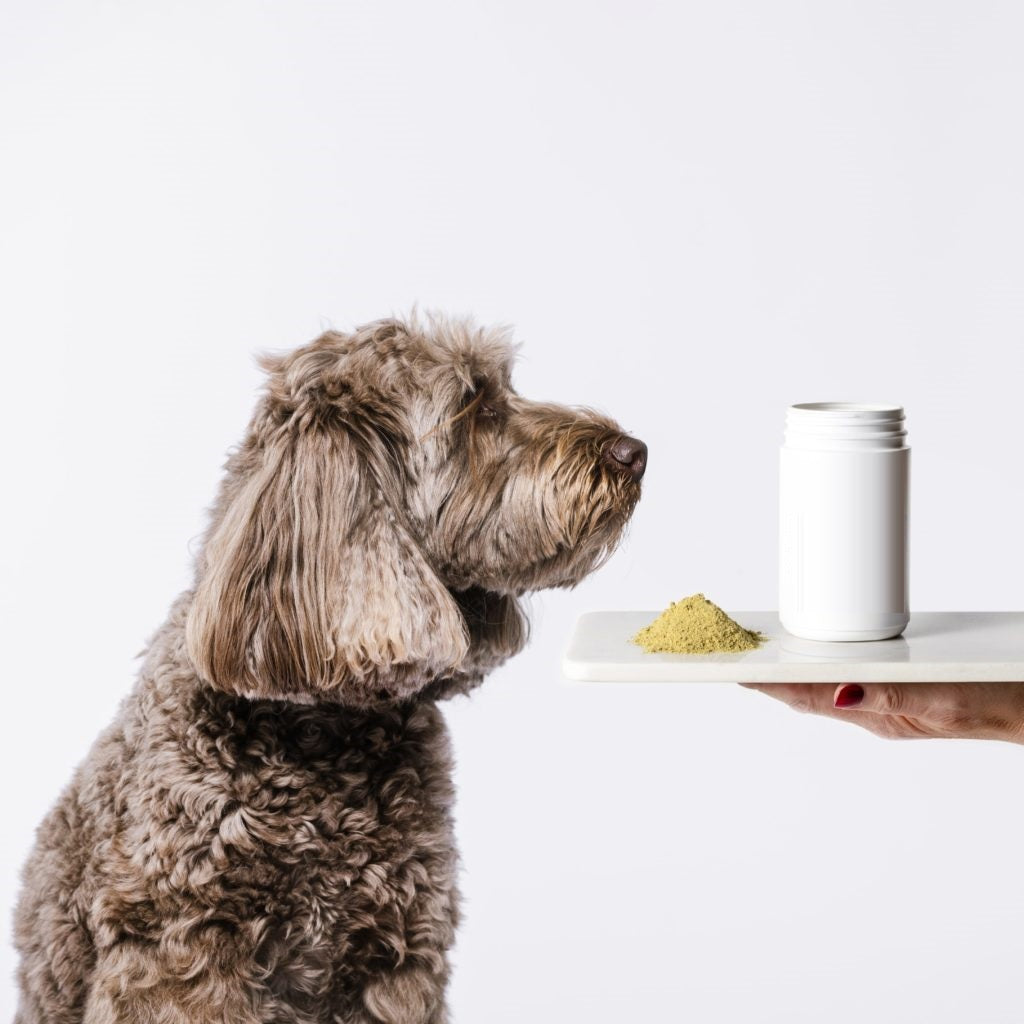A majority of your dog’s immune system is related to their gastrointestinal tract. So, for a happy and healthy dog, it becomes crucial for pet parents to prioritize the digestive health of their pups. Fortunately, you have a powerful tool at your disposal - Prebiotics!
By now, you may have already heard about how prebiotics are good for people, but do you know they’re also great for your dog? In this article, we’ll take a much deeper look into how exactly prebiotics can help support or improve your dog’s overall health. We’ll also share some natural prebiotic-rich foods that you can easily share with your dog.
First, let’s start by understanding what prebiotics are and how they work.
What are Prebiotics?
In simple terms, prebiotics are a food source for good or beneficial gut bacteria. They are essentially soluble fibers that do not get digested in your dog’s body. Instead, they pass through the digestive system intact and reach the intestine.
Therefore, the presence of prebiotics is important for the growth and activity of the beneficial bacteria that maintain a healthy gut environment and support digestive health.

Prebiotics vs. Probiotics
Both prebiotics and probiotics work together in order to maintain a healthy gut and digestive system in dogs. However, they aren’t the same thing. While prebiotics are a type of soluble fiber that serves as food for beneficial bacteria in the gut, probiotics are live microorganisms or strains of beneficial bacteria.
In short, probiotics are live, naturally occurring bacteria found in the gut, and prebiotics are their food. Now, naturally, your dog will have billions of beneficial bacteria in their stomach, but their population can decline due to various factors, including stress, illness, age, etc.
Also, there are lots of different kinds of probiotics, and some may not exist with certain dogs, or some have declined while others are fine. Adding more diversity of good bacteria/probiotics is another reason to incorporate supplements. It’ll help restore the population of beneficial bacteria and support their digestive health.
On the other hand, including prebiotic supplements would help in promoting the growth and activity of these beneficial bacteria.
Some pet owners also choose to give a combination of prebiotics and probiotics to their dogs to support their digestive health. However, it’s recommended to talk to a veterinarian and understand your dog’s health conditions and digestive concerns before adding any supplements to their diet.
Signs That Your Dog Needs Prebiotics
Chances are you’re feeding your dog a healthy and well-balanced diet, which may already include some natural prebiotics. So, do you need to give them more prebiotics? To answer this question, you should understand your dog’s health condition and see if they exhibit signs of:
- Frequent digestive issues, including diarrhea, constipation, and bloating
- Skin allergies and infections
- Stress or anxiety
- Weakened immune systems
In any of these cases, your dog might benefit from additional prebiotics in their diet. Moreover, it’s important to consult with a veterinarian if your dog has any health conditions and you want to supplement their diet with prebiotics.

Health Benefits of Prebiotics to a Dog
Below are the 6 amazing health benefits your dog can enjoy with a prebiotic supplement:
1. Promotes Gut Health
Prebiotics are a source of fuel for beneficial gut bacteria like lactobacilli and bifidobacteria. It allows them to grow and thrive while also inhibiting the growth of harmful bacteria like E. coli. This helps maintain a healthy gut environment and promotes the overall gut health of your dog.
Furthermore, the beneficial bacteria consume the prebiotics through fermentation, which results in the production of short-chain fatty acids (SCFAs). These acids provide energy to the cells lining the intestinal wall, which promotes the proper functioning of the gut barrier. They also possess some great anti-inflammatory properties that can help reduce gut inflammation.
2. Supports the Digestive System
Prebiotics are often recommended for dogs with digestive problems, including diarrhea, constipation, IBS, etc. It’s because prebiotics can help regulate bowel movements and improve stool consistency.
3. Improves Immune Function
Prebiotics can help improve your dog’s immune function by supporting their gut microbiome. It restricts the overgrowth of bad bacteria, which in turn improves their immune function. Also, prebiotics can contribute to enhanced immune cell activity and the production of immune-boosting substances, including antibodies.
4. Increases Nutrient Absorption
Prebiotics promote the growth of good gut bacteria, which plays an important role in breaking down food and extracting its nutrients. Additionally, prebiotics help in creating a favorable environment in the intestines for nutrient absorption by maintaining an optimal pH level.
5. Can Support Weight Management
Prebiotics can help maintain a healthy weight by supporting your dog’s digestive health. Their ability to create a balanced gut microbiome can also help in improving metabolic function and reduce the risk of obesity in dogs.

6. Prevents Blood Sugar Spikes
Prebiotics are soluble fibers that can help maintain proper blood sugar levels by slowing down digestion and the absorption process. This makes them beneficial supplements for dogs who have diabetes.
Prebiotics in Commercial Dog Food
Many commercial dog food brands have started adding prebiotics to their recipes. Some of the most commonly found prebiotics in pet food include:
- Fructooligosaccharides (FOS) - These are chains of fructose molecules that are found in various fruits, vegetables, and grains, like bananas, chicory roots, and oats. They are resistant to digestion in the small intestine, and they serve as a food source for beneficial bacteria in the large intestine, which makes them well-recognized prebiotics.
- Inulin - It’s a soluble fiber that is found in abundance in plants like chicory roots. Since these fibers have prebiotic properties, they can help support your dog’s gut health.
- Galactooligosaccharides (GOS) - This prebiotic is typically derived from lactose, a sugar found in milk. It’s very effective in supporting the dog’s digestive health and balanced gut microbiome. However, it can trigger a sensitivity or reaction in dogs who are lactose intolerant.
- Mannan oligosaccharides (MOS) - These are prebiotics derived from the outer cell wall of yeast. Similar to other prebiotic sources, they also help in supporting your dog’s digestive health by promoting the growth of beneficial bacteria.
When you’re buying food for your dog, you should read the label and examine the ingredient list to figure out if it contains prebiotics. You can look for any of the above-mentioned prebiotic names mentioned on the label.
Many dog food brands don't call out the specific type of prebiotic found in the food. In such cases, you can look for ingredients that we have listed in the next section.
You can also consult with your veterinarian about specific dog food brands that offer the best prebiotic supplements.
Note:
Some probiotic supplements contain maltodextrin, a sugar compound that has prebiotic effects. You need to be careful about this prebiotic as it’s considered harmful to dogs. That’s mainly because it can lead to an increase in blood sugar levels and, in the long run, can cause diseases like diabetes or obesity.
Natural Sources of Prebiotics for Dogs
If your dog often suffers from digestive problems, you should consult with a veterinarian and talk about adding prebiotic supplements to their diet. However, you can also add some natural sources of prebiotics into a dog's diet to support their digestive health.
Some of the best natural prebiotic sources for dogs include:
Banana
Bananas contain both fructooligosaccharides (FOS) and inulin. These prebiotics can be beneficial for your dog’s digestive and gut health. Plus, you can easily add this fruit to your dog’s diet as an occasional treat.

Chicory Root
Chicory roots are a rich source of prebiotic fiber inulin. They can be highly effective in supporting the growth and activities of good bacteria in a dog’s gut.
To incorporate chicory root into your dog's diet, you can either buy packed chicory root or chicory root powder and sprinkle or grate it over your dog’s regular meal. You can also roast the roots to make a crunchy treat for your dog.
Another convenient way is to buy dog food that already contains chicory roots. Many commercial dog food brands have started using chicory roots in their recipe because of the inulin.
Oats
Oats contain prebiotic fiber beta-glucan, which is healthy for your dog’s digestive system and immune function. Thus, you can consider making them oatmeal at home once in a while. Just remember to avoid feeding them raw oats, as they can be hard to digest.

Apple
More than half of the fiber content in an apple comes from a substance called pectin. It’s a prebiotic that can help feed the beneficial bacteria and prevent the overgrowth of harmful bacteria in your dog’s gut.
You just need to wash and peel the apples before serving, which makes this fruit another hassle-free option for pet owners. However, you need to be cautious about the seeds, stem, and core of the apple as it contains small amounts of cyanide.
If in case your dog accidentally eats a few seeds, there shouldn’t be any fatal consequences. But you should still remove these parts before feeding an apple slice to your dog.
Berries
Blueberries, raspberries, and strawberries contain soluble fibers like pectin and fructooligosaccharides (FOS), which act as prebiotics in the gut. Plus, dogs often find these fruits highly appetizing, making them enjoyable treats for every season.
Mushrooms
Mushrooms contain various carbohydrates with prebiotic properties, such as chitin, hemicellulose, mannans, xylans, and beta-glucans. However, the prebiotic content of mushrooms may vary depending on the species and growing conditions.
Some common mushroom species with high amounts of prebiotics include:
- Turkey Tail Mushrooms
- Shiitake mushrooms
- Lion’s Mane
- Chaga Mushrooms
- Maitake Mushrooms
Also note that while all these species of mushrooms are generally considered safe for dogs, you should buy them from a store and avoid picking any wild mushrooms. It’s because sometimes it can be hard to distinguish between different species of mushrooms, and confusing a toxic mushroom with an edible one can have severe consequences for your dogs.

Pumpkin
Pumpkin is considered super healthy for dogs, mainly because of its high soluble fiber content, which has prebiotic properties. It can help improve your dog’s digestive health by preventing both diarrhea and constipation.
It’s also a versatile fruit that can be served in various ways. You can make pumpkin puree and use it as a food topper or freeze it in molds to make fun treats. You can also stuff the puree in your dog’s Kong toy to keep your dog busy and active.
Just remember to use plain and cooked pumpkin that doesn’t contain any added seasoning, as that can be harmful to your dog’s health. You can also buy a canned pumpkin that doesn’t have other ingredients like spices, seasonings, and artificial sweeteners.
How to Add Prebiotics to Your Dog’s Diet?
Many commercial dog food options contain some prebiotics that may be sufficient for your dog. But if you want, you can either opt for commercial supplements or natural food sources to add prebiotics to your dog’s diet. You just need to be cautious and understand your dog’s health condition and nutritional requirements before making any changes to their diet.
If you have a perfectly healthy dog who eats a well-balanced meal, then you might not need to add any additional supplements. However, you can still talk to your veterinarian if you aren’t sure about whether or not your dog needs prebiotics.
Additionally, if you choose to give them prebiotics, it’s important to start with small amounts and gradually increase the dosage, allowing their digestive system to adjust to the change.
Remember that prebiotics are essentially soluble fibers, and suddenly, eating too much fiber can disrupt the digestive system. It can also increase the fermentation process, leading to excessive gas production, bloating, and irregular bowel movements.
Summing Up: Prebiotics for Dogs
Prebiotics can have numerous benefits for your dog’s health. They can promote gut health by supporting the growth and activity of good or beneficial bacteria while restricting the overgrowth of bad bacteria. It can also support your dog’s digestive health and prevent various health complications.
When selecting a prebiotic source for your dog, it’s important to talk to a veterinarian and understand your dog’s health needs. Accordingly, you can choose prebiotic supplements or consider adding natural sources like chicory root, bananas, or pumpkin to your dog’s diet.
If you have any further doubts about the health benefits of prebiotics for your dog, you can consult with a veterinarian.

FAQs
Let’s answer some frequently asked questions about probiotics and their health benefits for dogs:
1. Does my dog need prebiotics?
Whether your dog needs prebiotics or not will depend on their nutritional requirements and digestive concerns. While prebiotics can help support a healthy gut environment and digestive system by promoting the growth of beneficial gut bacteria, not every dog requires additional prebiotic supplementation.
If you have a healthy dog who eats a well-balanced meal, then you might not need to add any additional supplements. However, if your dog has sensitive stomach or digestive problems, they can benefit from prebiotics in their diet.
Ultimately, you should consult with your veterinarian to determine whether or not your dog needs prebiotics.
2. What prebiotics can I give my dog?
You can either choose commercial supplements or natural food sources like bananas, oats, apples, and pumpkins to feed prebiotics to your dog. You can also opt for commercial supplements that contain prebiotics like FOS, inulin, MOS, or GOS.
If you choose to buy commercial supplements, consult with your veterinarian to understand what would work best for your dog and their health.
3. What foods contain prebiotics for dogs?
There are several fruits, vegetables, and grains that contain prebiotics. For example, banana contains prebiotic fiber inulin and fructooligosaccharides (FOS); oats contain beta-glucan; chicory root contains inulin; apple contains pectin. These are all powerful prebiotics that can help support your dog’s digestive and gut health.
4. What do prebiotics do for dogs?
Prebiotics are indigestible fibers that will pass through your dog’s digestive system intact. They reach the intestine and serve as a food source for good or beneficial gut bacteria like lactobacilli and bifidobacteria.
Thus, prebiotics help in promoting the growth and activity of these good bacteria while also restricting the overgrowth of bad bacteria like E. coli. This helps maintain a healthy gut environment and supports digestive health.
5. How long does it take for prebiotics to work in dogs?
The time it takes for prebiotics to show results in dogs can vary depending on various factors. But in general, you typically have to wait for a few weeks or months to see a noticeable change in your dog’s health.
Sources:
https://www.veterinarians.org/prebiotics-for-dogs/




